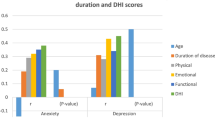Abstract
The main goal of the study is to determine the exact ratio of pure psychogenic dizziness. Patients from vertigo outpatient clinic were evaluated by SCL-90 R questionnaire, interviews, vestibular tests and magnetic resonance imaging (when needed). Five hundred and eighteen patients were evaluated for this study. While 45.2% of the patients have at least one abnormal psychogenic scale (somatization, obsessive-compulsiveness, interpersonal sensitivity, depression, anxiety etc.), only 9% of the patients were diagnosed as psychogenic dizziness according to the interview. One percent of 518 had no organic cause for dizziness and also diagnosed as pure psychogenic dizziness. Our results suggest that patients with dizziness need to be evaluated by psychological tests routinely and patients with high-test scores must consult a psychiatrist who is familiar with dizziness symptomatology.

Similar content being viewed by others
References
Bath AP, Walsh RM, Ranalli P, Tyndel F, Bance ML, Mai R, Rutka JA (2000) Experience from a multidisciplinary “dizzy” clinic. Am J Otol 21:92–97
Bolmont B,Gangloff P,Vouriot A,Perrin PP (2002) Mood states and anxiety influence abilities to maintain balance control in healthy human subjects. Neurosci Lett 329:96–100
Clark MR, Sullivan MD, Fischl M, Katon WJ, Russo JE, Dobie RA, Voorhees R (1994) Symptoms as a clue to otologic and psychiatric diagnosis in patients with dizziness. J Psychosom Res 38:461–470
Coker NJ, Coker RR, Jenkins HA, Vincent KR (1989) Psychological profile of patients with Meniere’s disease. Arch Otolaryngol Head Neck Surg 115:1355–1357
Dağ İ (1991) Belirti tarama listesi (SCL-90-R)’nin üniversite öğrencileri için güvenirliği ve geçerliği. Türk Psikiyatri Derg (J Turk Psychiatr) 2:5–12
Derogatis LR (1977) SCL-90: Administration, scoring and procedure manual-I for the (Revised) version. Johns Hopkins University School of Medicine, Clinical Psychometrics Unit, Baltimore
Eagger S, Luxon LM, Davies RA, Coelho A, Ron MA (1992) Psychiatric morbidity in patients with peripheral vestibular disorder: a clinical and neuro-otological study. J Neurol Neurosurg Psychiatr 155:383–387
Eckhardt-Henn A, Breuer P, Thomalske C, Hoffmann SO, Hopf HC (2003) Anxiety disorders and other psychiatric subgroups in patients complaining of dizziness. Anxiety Disord 17:369–388
Filipo R, Lazzari R, Barbara M, Franzese A, Petruzzellis MC (1988) Psychologic evolution of patients with meniere’s disease in relation to therapy. Am J Otol 9:306–309
Jacob RG (1988) Panic disorder and vestibular system. Psychiatry Clin North Am 11:361–374
Nagarkar AN, Gupta AK, Mann SBS (2000) Psychological findings in benign paroxysmal positional vertigo and psychogenic vertigo. J Otolaryngol 29:154–158
Perez N, Martin E, Garcia-Tapia R (2003) Dizziness: Relating the severity of vertigo to the degree of handicap by measuring vestibular impairment. Otolaryngol Head Neck Surg 128:372–381
Staab JP, Ruckenstein MJ (2003) Which comes first? Psychogenic dizziness versus otogenic anxiety. Laryngoscope 113:1714–1718
Yardley L, Luxon LM, Haacke NP (1994) A longitudinal study of symptoms, anxiety and subjective well being in patients with vertigo. Clin Otolaryngol 19:109–116
Author information
Authors and Affiliations
Corresponding author
Rights and permissions
About this article
Cite this article
Ardıç, F.N., Ateşci, F.Ç. Is psychogenic dizziness the exact diagnosis?. Eur Arch Otorhinolaryngol 263, 578–581 (2006). https://doi.org/10.1007/s00405-006-0013-2
Received:
Accepted:
Published:
Issue Date:
DOI: https://doi.org/10.1007/s00405-006-0013-2




